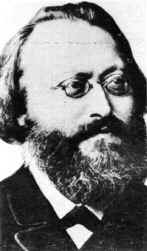|
Makers
Violin History & Timeline
PERFORMERS
Violin
Viola
Cello
Bass
Gamba, etc.
The Roots of Famous Violinists
TEACHERS
Violin
Viola
Cello
Bass
DEALERS
Listings
Specialist
Event
LUTHERIE
Bibliography
Listings
Gallery
COLLECTING
Identification
Buying
Selling
THE INSTRUMENTS
Violin
Viola
Cello
Bass
Viol
Bows
Tales
LINKS
Interesting Sites
GALLERY
Antique Instruments
Historical Photos
|
|
 Max Bruch was a
distinguished musician whose stunning compositions embody power and
energy. Born on January 6~í 1838 in Cologne, Bruchís parents
encouraged his love for music. His mother was a soprano who performed
professionally and gave music lessons. She directed Bruchís initial
musical studies, teaching him the piano at a young age. As a boy, Bruch
was encouraged to give informal concerts. At one such performance, the
renowned musician, Ignaz Moscheles, heard Bruch play and encouraged
Bruch to cultivate his remarkable talent. Max Bruch was a
distinguished musician whose stunning compositions embody power and
energy. Born on January 6~í 1838 in Cologne, Bruchís parents
encouraged his love for music. His mother was a soprano who performed
professionally and gave music lessons. She directed Bruchís initial
musical studies, teaching him the piano at a young age. As a boy, Bruch
was encouraged to give informal concerts. At one such performance, the
renowned musician, Ignaz Moscheles, heard Bruch play and encouraged
Bruch to cultivate his remarkable talent.
Within a few years, Bruchís musicianship received a
great deal of publicity. At the young age of fourteen, he was honored to
receive the Mozart Foundation Prize. Bruch went on to follow in Mozartís
footsteps, producing magnificent pieces that delight audiences and
performers alike.
Bruch decided to continue his romance with composing,
and so in 1865 he began to actively pursue a career in music. He was
appointed as the Music Director of Coblenz, where he was able to use his
creativity on a managerial level. Merely two years later, Bruch moved,
accepting the position of Court Kapellmeister in Sonderhausen. It was in
Sonderhausen that Bruch discovered his passion for teaching. During his
time, Bruchís understanding of multiple instruments grew, and he
developed confidence in his musical
ability.
Thus, when Bruch was offered the opportunity to
become the conductor of the Liverpool Philharmonic Society, he was
prepared for the challenge. The direction of this orchestra proved to be
fulfilling. In 1883 he toured throughout the United States, captivating
audiences, and on April th
of that year, a tremendous tribute
was given to him at the Ontario Street Temple. Bruch went on to become a
professor in Berlin. He divided his time between directing the musical
studies of devoted pupils, and composing spectacularly crafted pieces.
He was a diligent composer, and would edit and re-edit his works.
Bruchís violin concertos are particularly
celebrated. His Violin Concerto No. 1 in G Minor, Op. 26 is considered
to be one of the most magnificent violin concertos of all time. It is
one of the nine pieces that Bruch wrote for the violin. This great
composerís final work, the Spring Octet, was written the very year of
his death. It began as a rendition of a quintet that Bruch had
previously composed. The Spring Octet mysteriously disappeared after the
composerís death, and suddenly reappeared in 1986 when Lion Heart
Autographs offered it for sale. Later, it was donated to the Austrian
National Library, where the octet lies today. Bruchís life came to a
close when he was eighty two. Yet, his music lives on, continually
unraveling greater and greater depths of beauty and meaning.
Notes by Shanaira Udwadia (June-2001) |